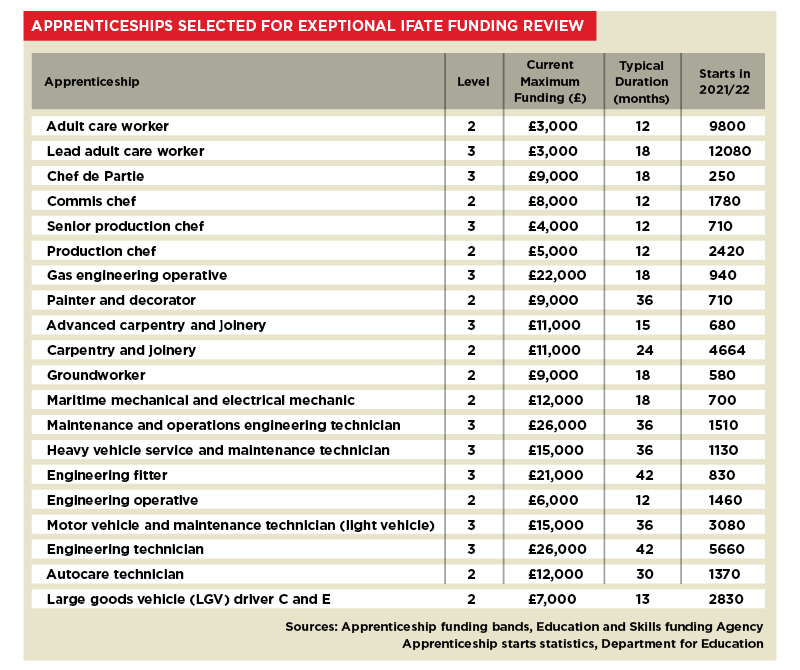The government’s “exceptional” apprenticeships funding uplifts review has finally been launched – but it is being limited to 20 apprenticeships.
And officials have confirmed that any uplift will only apply to new starters and not existing apprentices.
In November the Education and Skills Funding Agency announced plans to quickly increase funding bands in the hardest hit sectors to recognise the impact of soaring inflation on training delivery, with ambitions of unveiling details of the process at the end of that month.
At the time, top skills civil servants said there would not be a blanket rise across the board, but suggested employers and trailblazers would be able to apply for a temporary increase for all apprenticeships where they could demonstrate that costs had significantly increased.
Today, the Institute for Apprenticeships and Technical Education has announced this “exceptional funding band review” will only apply to 20 “high-volume apprenticeships in skills shortage occupations and priority sectors”. Evidence will be needed by “early” March the new funding bands will be implemented by May 1.
The ESFA confirmed that any funding uplift applied will only be for new learners, and will be funded from the existing apprenticeships budget.
The agency would not say what the maximum allocation is for the uplift.
IfATE said the 20 apprenticeships (see full list below) – which include lorry drivers, production chefs, adult care workers and painters and decorators – had been chosen by the DfE in consultation with provider representative bodies.
Factors which resulted in those 20 being chosen included available evidence on the impacts of costs rising, skills shortages, number of starts in 2021/22 and priority sectors.
Jill Whittaker, managing director at HIT Training which delivers some of the chef and adult care apprenticeships, said that increasing costs including staff pay, cost of living increases, end point assessment expenses and other costs meant some programmes such as its chef training were running at a loss.
“We have already made strong cases to IfATE around costs, so this [exceptional funding review] is very, very welcome,” she said.
“But we are disappointed to hear they are only looking at new starters, that is a big challenge – if we are already running at a loss on these programmes it’s going to be very challenging to find a way of recovering that.”
She has called on department chiefs to reconsider including existing learners because “those costs don’t start at that point in time they start their review, they are already being absorbed by training providers”.
Sue Pittock, chief executive of Remit Training, said: “We all have significant enrolment costs, energy costs, staff costs and building costs but haven’t had a pound increase in funding to cover inflationary increases in all of these costs in five years.
“I know 20 standards will be reviewed, which equates to 3 per cent of all standards, but that means a huge compromise for the rest of the sector. How can they possibly manage five years’ worth of inflation without some sort of financial assistance? Margins are very thin in apprenticeship delivery done properly and this will render quality delivery impossible for many providers without some sort of support.”
Pittock also raised concern about the four-month time frame for the introduction of the any uplifts, especially as some standards may only see a small increase. “Why would you wait four months to do an uplift of £500? You are not going to sit there and compile a huge amount of evidence for £500,” she added.
She continued that 16-18 college provision gets around 2 per cent increase each year over the last five years, while apprenticeships have had zero.
She added: “They need to be held in the same parity because apprenticeships are a vital part of our education ecosystem, so it would be great if the money could be found as it is for 16-18 college-based provision.”
IfATE said the exceptional review will not include a full apprenticeship content review that the ordinary revisions process includes, to help speed up the process.
The institute said that by limiting the number to 20 priority standards, funding recommendations could be made more quickly and provision for key standards protected.
IfATE is anticipating that funding increases for those 20 will be by one funding band only, and subject to affordability.
IfATE chief executive Jennifer Coupland said employers and training providers had clearly set out the difficulties they were facing, and added: “We have had to target support at these 20 priority apprenticeships, to ensure affordability and a rapid turnaround on funding decisions.”

The organisation confirmed that those which hadn’t been selected for the exceptional funding band review will be able to apply for a full funding band review as normal, although that process takes longer, and not all reviews lead to a boost in funding.
Additional guidance for those not in scope for the exceptional review, also published this morning, said that it normally works to eight-week approval cycles but IfATE will do all it can to speed that up if it can do so without compromising quality.
Jane Hickie, chief executive of the Association of Employment and Learning Providers (AELP), said that despite only 20 standards being in scope for funding band uplift reviews, these standards represent around 20 per cent of all apprenticeships starts “so it’s certainly a good start”.
She added: “It is absolutely right that adult care should be in the front rank of these uplifts given the existing poor funding levels and labour shortages there. Indeed, most of the sectors covered by today’s announcement were those highlighted as having the most pressing need for intervention in our recent rising costs survey.”
But Hickie stressed that high inflation rates are affecting the whole sector, so other standards “must not be left behind”.
Robert Halfon, minister for skills, apprenticeships and higher education, said: “This will support more businesses to take on apprentices, boost skills in key sectors, and drive economic growth.”
The 20 standards are as follows:


















It almost looks like a reverse engineered mis-application of the Pareto principle.
They originally said a temporary funding uplift was to reflect rising costs and the increased difficulty in some occupations to attract or retain delivery staff.
Providers are the ones with that information, but IfATE have arrived at the list of standards they have determined are in scope for priority sectors where there are skills shortages (so not really related to costs).
Increasing rates by a single band under the guise of controlling costs is interesting. A one band rise on a £3k apprenticeship is a 33% boost, whereas on a £26k standard it is less than 4%.
A cynic might conclude that this may be partly designed to herd providers towards those standards with the largest % increase and give a little boost to volumes by getting ‘cheap’ starts. (about half of the starts are on standards of £6k and below)
Either way, it’s the economic health of an industry that dictates how many apprentices it can support in the workforce and with a recession looming, some of those look more at risk than others.
Also perhaps telling that only levels 2 & 3 are included. There are apparently no cost or staffing pressures, nor skills shortages at higher levels or perhaps is this a back door way of acknowledging they have been better funded?
I am never sure what criteria IFATE work to, but in general all providers are struggling with costs and attracting good staff especially in the areas that we have apprentices, Sciences, Engineering and Data. We want the best provision delivered by the best staff and the idea that the funding formula should try and reduce the spend is non sensical. The ROI should be measured on the quality of the delivery, the quality of the outcomes and not some arbitrary measure that includes a value for the tax payer. The tax payer will be better served by having highly trained and productive apprentices whose training is of the highest quality and funded appropriately. Leave the funding alone.
Also you could argue that if the funding bands are to enable the delivery of quality outcomes, then the change in cost should relate to the change in cost in attracting trainers etc to deliver said outcomes. I would argue strongly that the issue providers are having in terms of attracting staff are not in some of these occupations and indeed where is Digital in all of this where probably there is the highest staff cost pressure.
The issue of ‘affordability’ is an easy angle – with 50% of the levy underspent, do they really think a marginal increase in funding rates is going to result in an explosion of starts ? Just shows how far away they are from understanding that there are other issues at play that drive Apprenticeship starts which are far more important than a marginal increase in funding.
IFATE could do well to examine the cost / benefit of EPA and get rid of it !!
Level 3 Gas engineering apprenticeship was previously £27k then reduced to £22k before any learner’s had completed? Am I missing something or how did that make sense. What about the plumbing qualifications level 2 no longer available as an apprenticeship ,only level 3 but all learner’s can not cope with a level 3 but still make excellent plumbers